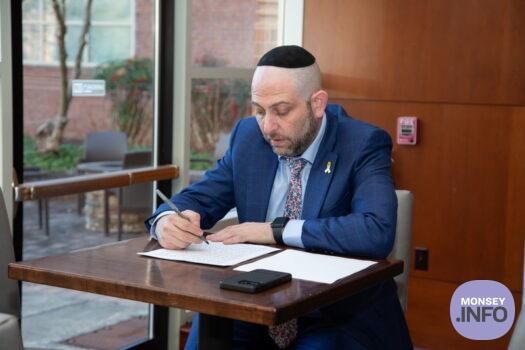
AMUDIM: Silver Linings
by Rabbi Zvi Gluck
It’s been a year, hasn’t it?
Having seen our worst nightmares come true, we’re all still scarred by October 7th, making the prospect of Rosh Hashana 5785 more than a little intimidating. After all, didn’t we search our souls and promise to be our very best selves last year on the Yomim Noraim? Didn’t we feel cautiously optimistic as the Heavenly gates closed on Hoshana Raba that we had been inscribed for good tidings?
And yet, less than a day later, our world imploded. So as we face Rosh Hashana and Yom Kippur, what are we supposed to do to tip the scales in our favor, living as we are in difficult times?
I think it is important to take a giant step back, and to realize that while this year was filled with so much pain and suffering, we saw how brightly Klal Yisroel’s light shone during the darkest moments. From the United Hatzalah volunteers who raced into the heart of the carnage on October 7th, to the planeloads of donated supplies that Amudim and others sent to Israel in the following weeks, to the steady stream of financial donations and more, Jewish communities stepped up to the plate in a big way.
Even today, the acts of solidarity still haven’t tapered off. There are still people with masking tape on their shirts counting the days our hostages have been in captivity. There are still tzedakah funds, volunteer drives and more happening, because none of us can go back to life as usual while Hamas, Iran and others continue spreading their poison and taking Jewish lives.
Despite the tears and the grief, this past year has demonstrated how goodness can thrive even in the darkest situations and it’s hard not to see the parallels to the work we do at Amudim, helping people in crises of all kinds get their lives back on track. And maybe it is those realities that can help us infuse special meaning into this year’s Yomim Noraim.
The concepts of teshuva, tefillah and tzedakah figure prominently in our davening, presented as the timeless formula to overturn a harsh decree. I humbly suggest that this year, we place extra emphasis on these concepts, possibly even adding something extra to the equation as we daven for a year filled with blessings and an end to the war.
Let’s start with teshuva, classically defined as returning to the path we are meant to follow. I believe that in addition to looking to draw nearer to Hashem, we can apply that same principle to our fellow man, by bringing people who are suffering close to us in a meaningful way. If you see someone who is suffering, instead of saying “We should do coffee sometime,” make that gesture exponentially more impactful by saying, “Can you do coffee tomorrow morning at 9:30?” or, “I’d love it if you came for lunch this Shabbos!”
We all know what tefillah means – davening. But in addition to showing Hashem how much we have changed this year, let’s make it a point to include those having a hard time in our prayers. It could be something as generic as, “Please help Klal Yisroel through this crisis,” to a more specific “Hashem, give Eli the tools to beat his drinking problem.” Feel free to put a sticky note in your siddur to remind yourself to include others in your davening so that your good intentions don’t accidentally getting lost by the wayside.
And tzedakah? With the Jewish community opening its hearts so generously to the war effort, it’s been an extremely challenging fundraising year for organizations across the board. While we at Amudim are incredibly grateful to each of the 3,000+ individuals who contributed to our Unite to Heal campaign, we still have a long way to go just to meet our budget.
We all have the right to walk into shul on Rosh Hashana and Yom Kippur with our heads held high, even on the heels of last year’s difficult judgement. We have reached deep into our hearts and stretched beyond our comfort zones amid incredibly trying circumstances, because we knew we needed to be there for each other. Let’s keep doing what we’ve been doing – davening for our hostages, their families, our soldiers, and our homeland, and helping those in Israel who are still deeply impacted. But having seen how much our community can accomplish when we come together, let’s bring that same passion to supporting those suffering from abuse, addiction and mental health issues in our communities. We’ve made so much progress embracing those facing difficult challenges since Amudim first opened its doors nearly 10 years ago. And even though we’ve helped more than 19,200 people in 66 countries, we know that there are still many others in need of our services.
Let’s all prove to Hashem that we are a people who answers “yes” to those who call out for help, and may our extra efforts be a source of merit that will allow us all to be inscribed for a year where we know true simcha and bracha.
Zvi Gluck is the CEO of Amudim, an organization dedicated to helping abuse victims and those suffering with addiction within the Jewish community and has been heavily involved in crisis intervention and management for the past 25 years. For more information go to www.amudim.org.









